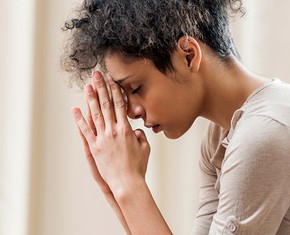The views expressed in our content reflect individual perspectives and do not represent the authoritative views of the Baha'i Faith.
Why do Baha’is pray each day? For me, it has something to do with the nature of the human soul. Just like the body needs food and water, our soul requires daily spiritual nourishment.
Baha’is can freely choose when to pray, and can use the revealed Baha’i prayers from Baha’u’llah, the Bab and Abdu’l-Baha, or they can spontaneously create their own personal prayers.
However, one basic law instituted by Baha’u’llah asks Baha’is to say aloud a daily obligatory prayer. Bahais can choose from three of those prayers: a short, medium-length or longer one, depending on their inclination and the circumstances they find themselves in. These prayers, prescribed to be said at different times of the day and in different modes, have varying lengths and levels of complexity. The short one takes just a few seconds to recite, while the longest one might take ten minutes—but regardless of their length, each of the three obligatory Baha’i prayers contains tremendous spiritual insight and wisdom.
The short Baha’i obligatory prayer, meant to be said once in 24 hours at noon, consists of just 50 words in three sentences. It confirms the believer’s faith in God and desire to worship Him. It also confirms the relative powerlessness and poverty of the believer, and his or her reliance upon the might of God. It ends with a recognition of the oneness of the Creator:
I bear witness, O my God, that Thou hast created me to know Thee and to worship Thee. I testify, at this moment, to my powerlessness and to Thy might, to my poverty and to Thy wealth. There is none other God but Thee, the Help in Peril, the Self-Subsisting. – Baha’u’llah, Baha’i Prayers, p. 3.
When I chose to become a Baha’i, I knew about the obligatory prayers, but it took me years to train my mind and heart to remember and make time to say one. I even set the alarm on my watch for noon as a reminder. Working in an office, I came to love finding that quiet private moment to recite the noon-day obligatory prayer. It became a beneficial habit, generating a feeling of achievement when I did and disappointment when I forgot. It also anchored me, each day, in the reality of my soul, helping me recognize my spiritual reality in the midst of this physical world:
Know thou that in every word and movement of the obligatory prayer there are allusions, mysteries and a wisdom that man is unable to comprehend, and letters and scrolls cannot contain. – Abdu’l-Baha, quoted in Baha’u’llah’s Most Holy Book, p. 167.
All three of the obligatory Baha’i prayers deal with the certitude and assurance that a loving God will assist us. Both the medium and long obligatory prayers have prescribed motions or activities associated with them. With the medium-length prayer, for example, comes washing of the hands and face, standing and sitting during its recitation. That prayer, performed in the morning, at noon, and in the evening, takes a mere four to five minutes to say each time.
These three Baha’i obligatory prayers have helped me understand that the power of prayer cannot be underestimated. The mere act can lift one’s spirit and bring hope to the hopeless:
O thou who art turning thy face towards God! Close thine eyes to all things else, and open them to the realm of the All-Glorious. Ask whatsoever thou wishest of Him alone; seek whatsoever thou seekest from Him alone. With a look He granteth a hundred thousand hopes, with a glance He healeth a hundred thousand incurable ills, with a nod He layeth balm on every wound, with a glimpse He freeth the hearts from the shackles of grief. He doeth as He doeth, and what recourse have we? He carrieth out His Will, He ordaineth what He pleaseth. Then better for thee to bow down thy head in submission, and put thy trust in the All-Merciful Lord. – Abdu’l-Baha, Selections from the Writings of Abdul-Baha, p. 51.
Praise be to God, thy heart is engaged in the commemoration of God, thy soul is gladdened by the glad tidings of God and thou art absorbed in prayer. The state of prayer is the best of conditions, for man is then associating with God. Prayer verily bestoweth life, particularly when offered in private and at times, such as midnight, when freed from daily cares. – Ibid., p. 202.
The long obligatory Baha’i prayer, recited once in 24 hours, moves me to tears when I say it, and compels me to contemplate deeply the meaning of its words. It begins with an invocation to God “to make of my prayer a fire that will burn away the veils that have shut me out from Thy beauty.” – Baha’u’llah, Baha’i Prayers, p. 7.
When I allow myself to be swept away by the beauty and sincerity found in that longer prayer, I feel moved on many levels to respond to God’s call to servitude and faith. Its phrase “I am Thy servant, O my Lord, and the son of Thy servant” recognizes our relationship with our Creator. When we attest that we are “standing ready to do Thy will and Thy desire,” we acknowledge that station of servitude. When we ask God to “Look not upon my hopes and my doings, nay rather look upon Thy will that hath encompassed the heavens and the earth,” we become aware of our dependence on His mercy. In that prayer, I’m able to bare my soul and receive assurance of its eternal existence:
Make my prayer, O my Lord, a fountain of living waters whereby I may live as long as Thy sovereignty endureth, and may make mention of Thee in every world of Thy worlds. – Ibid.
















Comments
Sign in or create an account
Continue with Googleor